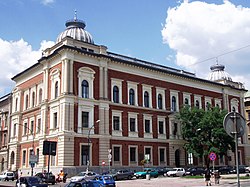Krakow art academy
|
Akademia Sztuk Pięknych w Krakowie
im. Jana Matejki |
|

Main building, on Kraków's Jan Matejko Square
|
|
| Type | Public |
|---|---|
| Established | 1818 |
| Rector | Professor Jan Pamuła |
|
Academic staff
|
6 nine-month faculties |
|
Administrative staff
|
353 |
| Students | 822 (2001/02) |
| Address | Plac Matejki 13, 31-157 Kraków, Kraków, Poland |
| Campus | Urban |
| Website | http://www.asp.krakow.pl |
The Jan Matejko Academy of Fine Arts, or the Kraków Academy of Fine Arts (Polish: Akademia Sztuk Pięknych w Krakowie im. Jana Matejki, usually abbreviated to ASP), is a public institution of higher learning located in downtown Kraków, Poland. It is the oldest Polish fine-arts academy, established in 1818 and granted full autonomy in 1873.
ASP is a state-run university that offers 5- and 6-year Master's degree programs. As of 2007, the Academy's faculty comprised 94 professors and assistant professors as well as 147 Ph.D.s.
The Academy of Fine Arts (ASP) was originally a subdivision of the Jagiellonian University's Department of Literature and was initially (1818–1873) called School of Drawing and Painting (Szkoła Rysunku i Malarstwa). Among its original teachers were Polish Neoclassicist Antoni Brodowski, and Franciszek Ksawery Lampi, a world-renowned landscape and portrait artist in Congress Poland whose most notable students there were Wojciech Korneli Stattler (teacher of Jan Matejko) and Piotr Michałowski, equestrian master artist of the Romantic period.
ASP received the status of an independent institution of higher learning in 1873 as the School of Fine Arts (Szkoła Sztuk Pięknych). The first President of the Academy was painter Jan Matejko, who brought in other leading artists as professors including Jan Nepomucen Głowacki, the most outstanding landscape painter of the early 19th century in Poland, as well as Florian Cynk, Aleksander Gryglewski and Leopold Loeffler, member of the Vienna Academy of Fine Arts. The main building based on a neoclassical design by architect Maciej Moraczewski was erected in today's Matejko Square in 1879. In 1893–95 its principal was a broadly educated Władysław Łuszczkiewicz (another teacher of Jan Matejko and later, his close associate) who also served as conservator of architectural monuments in the city.
...
Wikipedia
